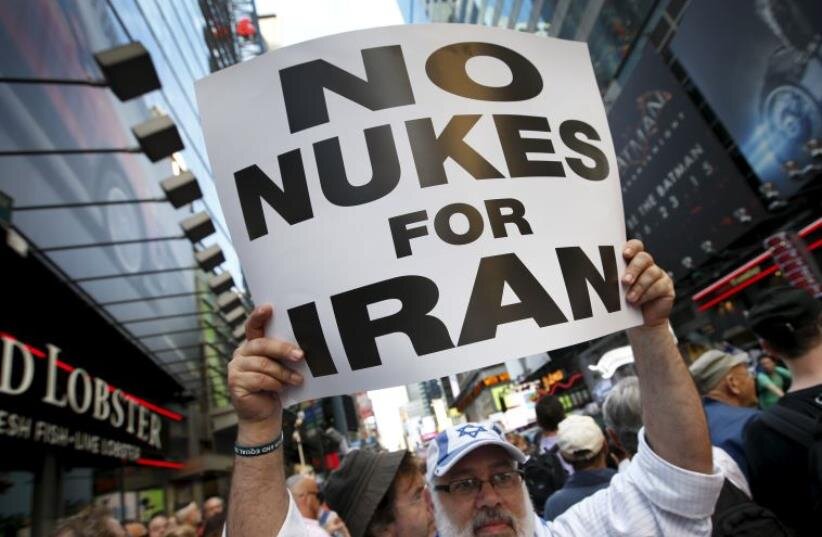د. ماجد رافيزادا: ازدياد الدعم لإسرائيل بهدف تمكين قيامها بضرب إيران
Support growing for an Israeli strike on Iran
Dr. Majid Rafizadeh/Arab News/December 19/2021
Israeli leaders are again threatening to target the Iranian regime’s nuclear installations as they did in 2013 without making good on the warning. However, the geopolitical and sociopolitical situations are different this time, and Israel’s ultimatum must be taken seriously.
Two years before the Joint Comprehensive Plan of Action was reached in 2015, the Israeli government said that it would strike Iran’s nuclear facility. At the time, Benjamin Netanyahu, then prime minister, warned: “Our clocks are ticking at a different pace. We’re closer than the US. We’re more vulnerable. And therefore, we’ll have to address this question of how to stop Iran, perhaps before the US does. If sanctions don’t work, they have to know that you’ll be prepared to take military action — that’s the only thing that will get their attention.”
But Israel did not attack. Some scholars, politicians and policy analysts may argue that since Israel failed to follow up its threats against Iran’s nuclear installations in the past, its current statements are merely rhetoric. However, several factors suggest Israel may, indeed, strike this time.
First, in order to take military action, Israel needs public support. Before the nuclear deal was reached in 2015, most Israelis opposed the government striking Iran’s nuclear sites alone. But according to a recent report by Israel Democracy Institute, a majority of Jewish Israelis, 58 percent, would now support an attack.
What is more intriguing is that most would support a strike even without the approval of Israel’s staunch ally the US. In a 2018 poll, only 10 percent of Israelis agreed with a “military assault on Iran’s nuclear facilities without coordinating with the US,” while almost 50 percent were in favor of a “military assault on Iran’s nuclear facilities in coordination with the US” if Iran renewed its nuclear activities.
In addition, an overwhelming majority believe that the Iranian regime represents an existential threat to a “large” or “very large” extent.
Second, public opinion in Iran has also shifted. Before 2015, there was a fear that an external Israeli attack on Iran would rally the Iranian people behind their government in the bid for nuclear enrichment. At the time Hassan Rouhani, the then president, enjoyed some popularity in Iran as he portrayed himself as a moderate seeking to improve the economy, promote human rights and normalize relationships with the West.
Public opinion in Iran has significantly shifted against the theocratic establishment, as seen in the latest protests.
There was also concern that an Israeli attack would also give the hard-liners a reason to quickly reach the nuclear threshold, and the Islamic Republic would likely decline to cooperate with the international community as well as pull out of the non-proliferation treaty. As a result, at the time, the unintended repercussions and negative consequences of an Israeli attack outweighed the benefits that the strikes might bring in delaying Iran’s nuclear program.
However, public opinion in Iran has significantly shifted against the theocratic establishment, as seen in the latest protests. Chants such as “Reformists, hard-liners, the game is now over” have become popular. In addition, Tehran is already violating all the restrictions and advancing its nuclear program at a rapid pace.
Third, Israel probably chose not follow up with its threats between 2013-2015 because some politicians were cautiously willing to give the Washington administration a chance to try diplomacy in the hope that the Iranian regime would halt its nuclear program and alter its destructive behavior in the region. Furthermore, former US President Barack Obama promised that he was “confident” the deal would “meet the national security needs of the US and our allies.”
But now Israel is less likely to trust any nuclear deal reached with the Islamic Republic because it has already seen its disastrous consequences. After the agreement was sealed in 2015, not only Israel but also other regional powers came to witness its negative impact first-hand. As sanctions against Iran were lifted, it quickly became clear that the treaty gave the Iranian regime global legitimacy.
This newfound legitimacy and the lifting of sanctions generated billions of dollars in revenue for Iran’s military institution, the Islamic Revolutionary Guard Corps, as well as for its proxy militia and terror groups. Tehran used this money to expand its influence throughout the region, including in Syria, Iraq, Yemen and Lebanon. Its expansionist campaign has proved to be immensely successful.
Israel, as well as Gulf Arab states, recognized that the threat Tehran poses was never adequately thwarted by the JCPOA. The region saw increased Houthi rocket launches at civilian targets in Saudi Arabia, the deployment of thousands of Hezbollah foot soldiers in Syria, and the near-constant bombardment of southern Israel by Iranian-funded Hamas rockets.
In summary, due to the latest geopolitical developments, as well as the shift in public opinion regarding the Iranian regime, Israel this time may well carry out its threats to strike Iran’s nuclear facilities.
*Dr. Majid Rafizadeh is a Harvard-educated Iranian-American political scientist. He is a leading expert on Iran and US foreign policy, a businessman and president of the International American Council. He serves on the boards of the Harvard International Review, the Harvard International Relations Council and the US-Middle East Chamber for Commerce and Business. Twitter: @Dr_Rafizadeh























